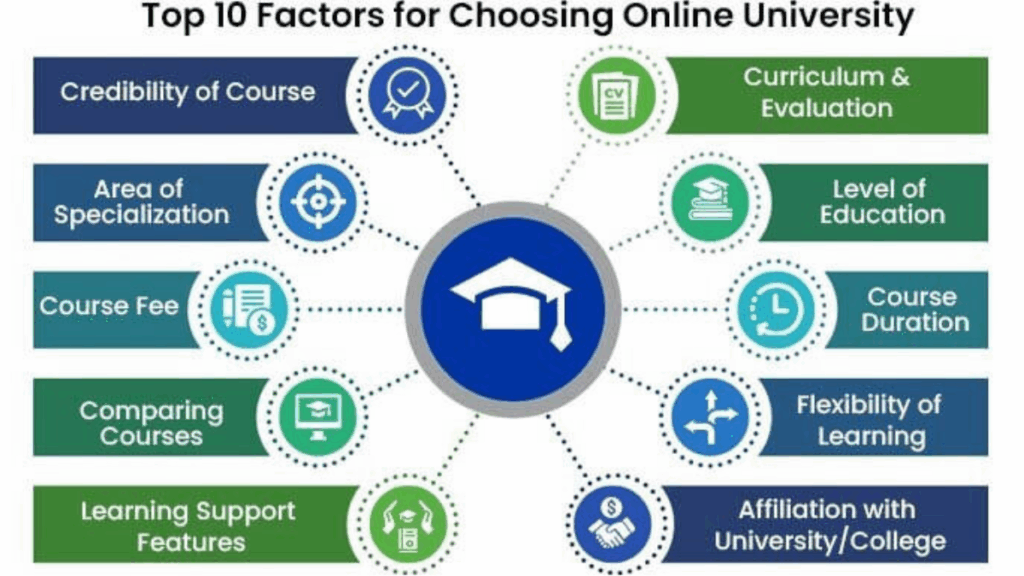The job market is evolving faster than ever before, with employers increasingly valuing skills, certifications, and practical knowledge alongside traditional degrees. In this environment, virtual university courses—offered entirely online—have emerged as a powerful tool for career advancement. But the question remains: can virtual university courses truly help advance your career? This article explores the benefits, types of courses, strategies for success, and the real impact online learning can have on professional growth.
Key Takeaways
- Virtual university courses offer flexibility, accessibility, and cost-effective learning opportunities.
- Popular courses for career advancement include business, IT, healthcare, marketing, finance, and education.
- Accreditation, faculty expertise, and course relevance are critical when choosing virtual programs.
- Online courses enhance skills, credentials, and networking opportunities, often leading to promotions and higher salaries.
- Challenges such as self-motivation, limited hands-on experience, and technology dependence require proactive strategies.
- Practical application of learned skills is essential to translating virtual education into career growth.
- Lifelong learning through virtual courses helps professionals remain adaptable and competitive in their fields.
What Are Virtual University Courses?

Virtual university courses are structured educational programs offered by accredited institutions through online platforms. These courses can range from short-term certifications and skill-building modules to full degree programs, including bachelor’s, master’s, and even doctoral degrees.
Key Features of Virtual University Courses
- Flexibility: Students can learn at their own pace and schedule, making it ideal for working professionals.
- Accessibility: Courses are available worldwide, breaking down geographic barriers to education.
- Diverse Offerings: Programs cover business, technology, healthcare, arts, sciences, and more.
- Cost-Effectiveness: Typically less expensive than traditional on-campus programs, with additional savings on commuting and accommodation.
Why Consider Virtual University Courses for Career Advancement?
Virtual university courses provide several advantages that make them a valuable tool for professional growth.
Upgrade Skills and Knowledge
One of the primary reasons professionals enroll in virtual courses is to acquire new skills or update existing ones. Rapid technological advancements mean that staying current in your field is essential. Courses in data analytics, digital marketing, software development, or project management can provide a competitive edge.
Flexibility for Working Professionals
Traditional education often requires a full-time commitment that is difficult to balance with work. Virtual courses allow learners to study in the evenings, on weekends, or at any time convenient for them. This makes continuous learning feasible without sacrificing employment.
Enhancing Credentials
Completing virtual courses from reputable universities can boost your resume. Certifications, badges, and degrees obtained online are increasingly recognized by employers as evidence of competence and dedication.
Networking Opportunities
Even in a virtual environment, students can interact with peers, instructors, and industry professionals through discussion forums, webinars, and group projects. These networks can lead to mentorship, collaboration, and career opportunities.
Career Transition Opportunities
Virtual university courses allow professionals to switch careers or industries by gaining relevant knowledge in a new field. For instance, a marketing professional might take courses in data science to transition into analytics-driven roles.
Popular Virtual Courses That Can Advance Your Career
Certain courses are particularly effective in opening career opportunities or boosting existing roles.
Business and Management Courses
Courses in business administration, project management, entrepreneurship, and leadership are highly valuable. They help professionals develop strategic thinking, decision-making, and management skills crucial for senior roles.
Technology and IT Courses
Technology is a dominant factor in career growth today. Courses in software development, cybersecurity, artificial intelligence, cloud computing, and IT project management equip students with high-demand skills.
Healthcare and Nursing Courses
Healthcare professionals can take online courses in administration, public health, or specialized nursing programs to advance in clinical or leadership roles. These courses enhance knowledge, improve patient care, and increase eligibility for promotions.
Marketing and Digital Marketing Courses
Marketing courses, particularly in digital channels, social media, and analytics, are in high demand. Professionals who understand data-driven marketing strategies are better equipped for modern business challenges.
Finance and Accounting Courses
Finance professionals can advance through courses in financial analysis, accounting standards, investment management, and risk assessment. These skills are vital for roles in banking, corporate finance, and consulting.
Education and Teaching Courses
Educators can benefit from online programs in curriculum design, educational technology, and leadership. These courses open opportunities for administrative positions or roles in training and development.
How Virtual University Courses Can Directly Impact Your Career
Virtual courses offer tangible benefits that translate into career growth.
Skill Acquisition and Competence
Employers highly value candidates who can demonstrate practical skills relevant to their roles. Online courses provide specialized training that enhances job performance and productivity.
Job Promotions and Salary Increases
Completing relevant courses can make professionals eligible for promotions, pay raises, or higher-responsibility roles. Credentials obtained through recognized universities signal commitment and capability to employers.
Industry Recognition
Virtual courses from reputed institutions often carry weight in professional circles. Recognized certifications can increase credibility and open doors to conferences, workshops, and professional associations.
Building a Portfolio
Online courses frequently include practical projects, case studies, or capstone projects that can be showcased in a portfolio. This tangible evidence of skills can be influential during job interviews.
Adaptability and Lifelong Learning
Taking virtual courses fosters adaptability, a crucial trait in rapidly changing industries. Professionals who continuously learn are more likely to thrive in uncertain job markets.
Factors to Consider When Choosing Virtual University Courses

Selecting the right course is critical to ensure meaningful career impact. Consider these factors:
Accreditation and Reputation
Ensure the university offering the course is accredited and has a positive reputation. Employers are more likely to recognize credentials from well-known institutions.
Course Content and Relevance
Analyze whether the course content aligns with your career goals. Look for programs that provide practical, industry-relevant skills.
Duration and Flexibility
Choose courses that fit your schedule and learning pace. Some courses can be completed in weeks, while others require months or years.
Faculty Expertise
Experienced instructors bring real-world knowledge and insights that enrich the learning experience. Research the faculty’s background and qualifications.
Cost and Financial Aid
Consider tuition fees and additional costs. Many universities offer scholarships, discounts, or flexible payment plans for online learners.
Support Services
Look for universities that provide strong support, including academic advising, technical assistance, and career counseling.
Challenges of Virtual University Courses
While virtual courses are advantageous, they also present challenges:
Self-Motivation and Discipline
Online courses require a high degree of self-discipline. Without a traditional classroom structure, students must manage their own schedules and maintain consistent effort.
Limited Hands-On Experience
Some fields, especially healthcare and engineering, may require physical lab work or clinical practice. Students must check whether online programs provide alternatives or hybrid options.
Technology Dependence
Virtual courses rely heavily on stable internet connections and modern devices. Technical difficulties can hinder the learning experience.
Social Interaction Limitations
While networking is possible online, it may not match the depth of in-person interactions. Students must actively engage in virtual platforms to build connections.
How to Maximize Career Benefits from Virtual University Courses
To fully leverage virtual courses for career advancement, follow these strategies:
Set Clear Career Goals
Identify the skills or qualifications needed for your desired role. Choose courses that align with these objectives to maximize relevance.
Create a Dedicated Learning Space
A quiet, organized environment enhances focus and reduces distractions during online study sessions.
Maintain a Consistent Schedule
Treat online learning like a job. Dedicate regular hours each week to studying, assignments, and virtual class participation.
Engage with Peers and Instructors
Active participation in discussions, group projects, and webinars enhances understanding and builds professional networks.
Apply Learning Practically
Use the knowledge gained in your current job or through freelance projects. Practical application reinforces learning and demonstrates competence to employers.
Showcase Credentials
Add completed courses, certifications, and projects to your resume, LinkedIn profile, or personal portfolio to highlight new skills.
Seek Continuous Learning
Career advancement is an ongoing process. Regularly enroll in relevant courses to stay updated with industry trends and maintain a competitive edge.
Case Studies: Virtual Courses Driving Career Growth
Technology Professional Advancing Through IT Certifications
A software engineer enrolled in an online course in cloud computing and cybersecurity. Within a year, they were promoted to a senior role managing cloud infrastructure projects, demonstrating the direct impact of virtual courses on career growth.
Healthcare Worker Transitioning to Management
A registered nurse pursued an online healthcare administration course. The acquired knowledge allowed them to transition into a hospital administrative position, increasing salary and responsibility.
Marketing Specialist Mastering Digital Marketing
A marketing professional took online courses in SEO, analytics, and social media strategies. These skills led to a promotion as a digital marketing manager, with oversight of a larger team and budget.
These examples illustrate that virtual courses, when chosen strategically, can lead to measurable career advancements.
Also Read : Which Online Universities Offer the Most Popular Degrees?
Conclusion
Virtual university courses are more than just an alternative to traditional education—they are a strategic tool for professional growth. By providing flexible learning, industry-relevant skills, and recognized credentials, online courses can enhance employability, enable career transitions, and increase earning potential. While challenges like self-discipline and limited hands-on experience exist, strategic planning, active engagement, and practical application of knowledge can maximize the benefits. Ultimately, virtual courses empower professionals to take control of their careers and remain competitive in an ever-evolving job market.
Frequently Asked Questions (FAQs)
Can virtual university courses really help me get promoted?
Yes. Courses that provide relevant skills and certifications demonstrate your commitment and competence, often making you eligible for promotions.
Are online courses recognized by employers?
Many employers recognize online degrees and certifications, especially from accredited and reputable universities.
How long do virtual university courses take to complete?
Duration varies widely, from a few weeks for short certifications to several years for full degree programs.
Can I study online while working full-time?
Absolutely. Virtual courses are designed to offer flexibility, allowing professionals to balance work and study effectively.
What types of skills can I learn through virtual courses?
Skills range from technical abilities (coding, cybersecurity) to soft skills (leadership, communication, project management).
Do virtual courses offer networking opportunities?
Yes. Discussion forums, webinars, and group projects enable interaction with peers, instructors, and industry professionals.
How do I choose the best virtual course for my career?
Consider factors like accreditation, course relevance, faculty expertise, duration, cost, and available support services.
This article comprehensively explains how virtual university courses can advance careers, backed with practical examples, strategies, and guidance for choosing the right programs.



